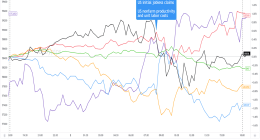Guardian environment correspondent Fiona Harvey discusses why the last 50 years of environmental action have shown how civil society can force governments and business to change and why that should give campaigners optimism for the future
Faced with multiplying and interlinked environmental crises in the 2020s – the climate emergency, the sixth extinction stalking the natural world, the plastic scourge in our oceans – it is easy to feel overwhelmed, Guardian environment correspondent Fiona Harvey tells Rachel Humphreys. But it’s also easy to forget that environmentalism is arguably the most successful citizens’ mass movement there has been. Working sometimes globally, at other times staying intensely local, activists have transformed the modern world in ways we now take for granted.
Campaigner Janet Alty tells Rachel about how her local campaign to ban lead in petrol became part of a much bigger movement called CLEAR – the Campaign For Lead-Free Air. Their campaign took years. But in 1983, a damning verdict from the Royal Commission on Environmental Pollution prompted the UK government to decree that both petrol stations and manufacturers must offer lead-free alternatives. Leaded fuel was finally removed from the last petrol pumps in the UK in 1999.




